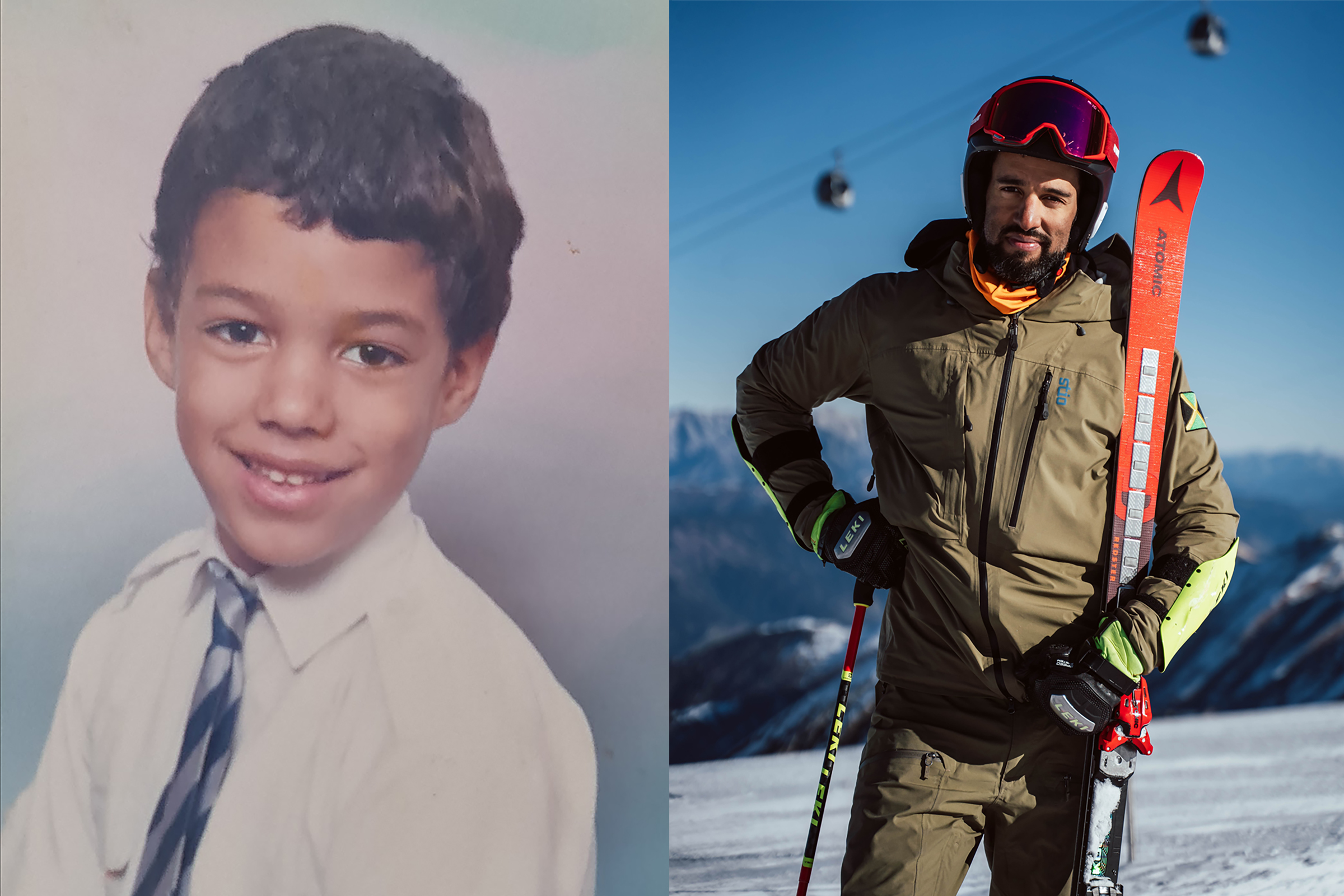
It’s close to 6:30 on an October evening in Hintertux, Austria, where the world’s serious ski racers have descended to train ahead of the 2022 Winter Olympics in Beijing; in this travel-restricted pandemic present, it’s one of the only snow-covered options available at this time of year. From his hotel room, Benjamin Alexander checks the time. We’ve been talking for hours and he has plenty more to tell me. But right now, Jamaica’s potential Olympic ski team of one needs to catch a bus to keep a promise: he’s been invited to dinner with a passel of teenaged ski racers to tell them about what’s possible.
This 37-year-old Englishman is a little out-of-the-box as an Olympic skier, outside of an insane drive to accomplish whatever goal he sets for himself. Benji, as he introduces himself with a contagious energy, didn’t grow up geographically gifted with a nearby ski resort or financially gifted with the means to travel to one. And he’s not white, as ski racers almost exclusively are.
Almost. Way before Alexander, there was the indomitable Seba Johnson, the first Black female ski racer in the Olympics in 1988, representing the Virgin Islands—at age 14, she was also the youngest female athlete to ever compete in the Winter Games. And among those on the short contemporary list, in 2001, Andre Horton made the U.S. Alpine Team as its first Black skier. In the 2018 Olympics, Sabrina Simader alpine raced for Kenya and Mialitiana Clerc raced for Madagascar. And there’s Errol Kerr, the American ski-cross athlete of Jamaican descent who was the only member of the Jamaican ski team at the 2010 Olympics, finishing ninth overall.
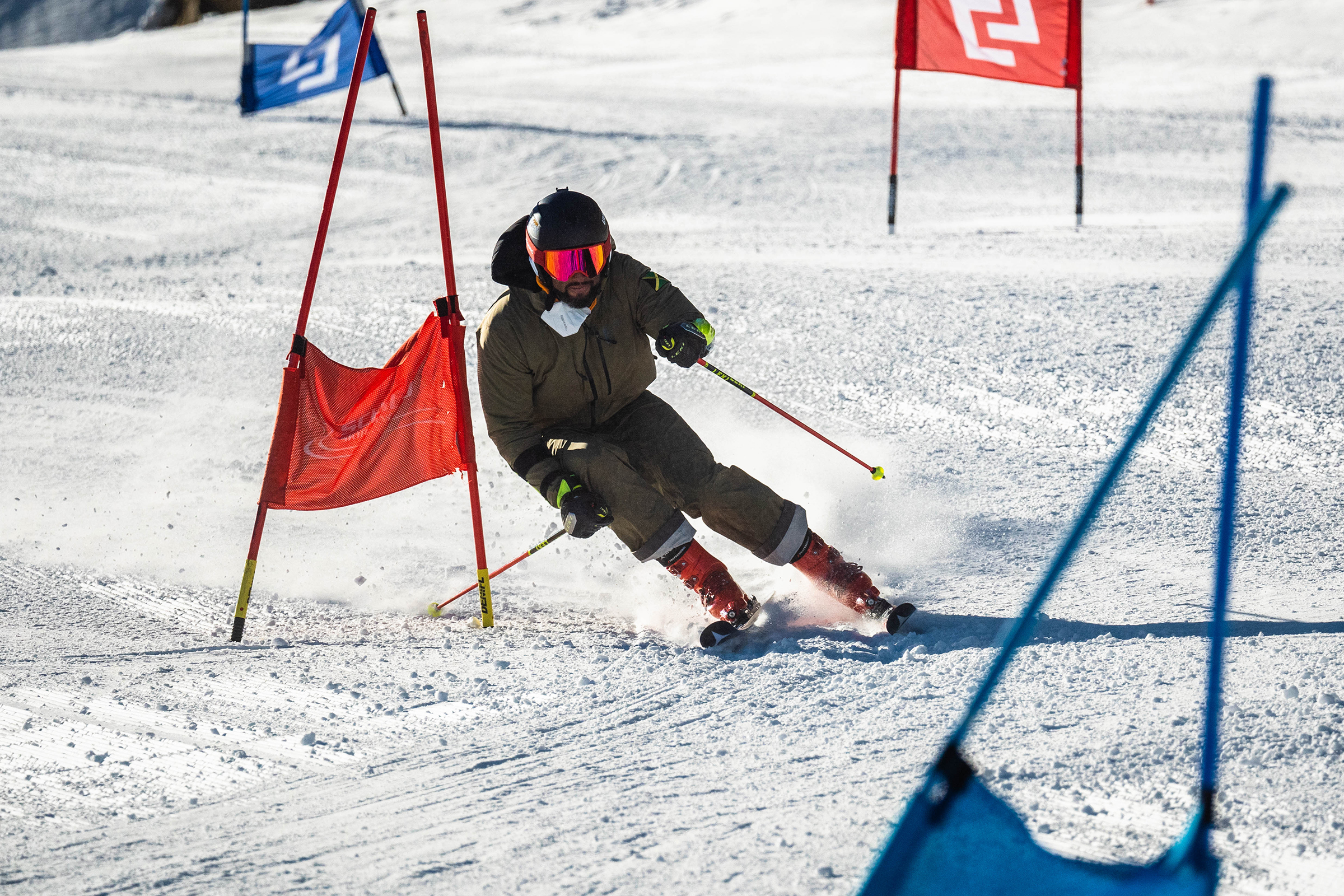
Alexander stands at the precipice of joining their Olympic ranks. Although he’s ranked 4,236th in the world—that’s not a typo—in his event, the giant slalom, under Olympic rules that encourage participation from a diverse range of countries, he just needs to get his International Ski Federation (FIS) points down to 160. That’s the minimum required to qualify for the Olympics (in a system where the race winner is given a score of zero, lower points are desired). His current score is 320, but given he cut it down to that from 505 in just the month of March before last winter’s race season ended, he considers reaching 160 a doable feat—potentially earning his spot in the Winter Games by Dec. 17 at a pair of qualifying races in Bosnia.
The difference between previous Black ski racers (and most racers he’s competing against now) and Alexander, though, is that they’d been skiing since long before they became legal adults. Alexander didn’t click into skis until a mere five years ago. Which is a big part of why, when Alexander talks about his life, it takes a long time to get to the skiing part.
He likes to start his story with his unlikely international DJ career, born when he was barely older than the teenagers he’s meeting tonight. In an era of pirate radio stations trolling London frequencies, when the motor skill to manipulate two pieces of vinyl into harmonious music was still requisite, Alexander was spinning garage music in the kinds of clubs where violence regularly broke out.
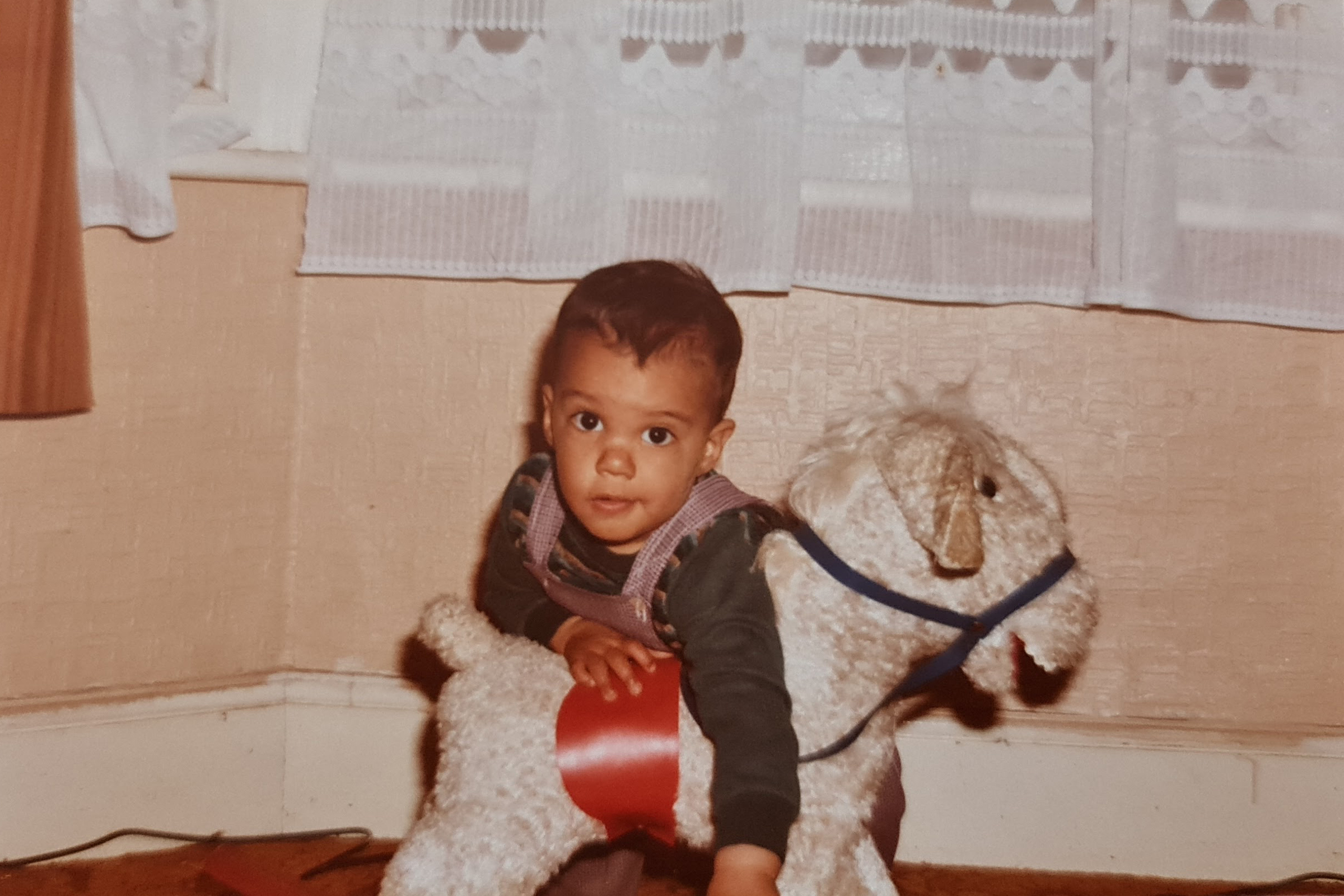
But we’ll start the story before that, with his Jamaican father, Keith, whose parents toted him to the U.K. as a toddler, where years later, Keith fell in love with a British white woman, Ann. We’ll fast forward to after the couple, both laboring in factories, moved to the working-class neighborhood of Wellingborough in search of affordable living, after they had two boys and named the oldest Benjamin, who proved to have such a head for engineering that he was building computers in his bedroom by the age of 12. We’ll speed past Alexander’s first year at university studying physics, past his pivot to engineering and a lackluster, if lucrative, job in finance.
“He’s got so much brains inside his head, he’s thinking ahead all the time, my Ben,” says Ann. She and Keith, on the verge of retirement from their blue-collar jobs, still live in the same house in Wellingborough. “He was always motivated, there was no stopping him once he says he’s going to do something.”
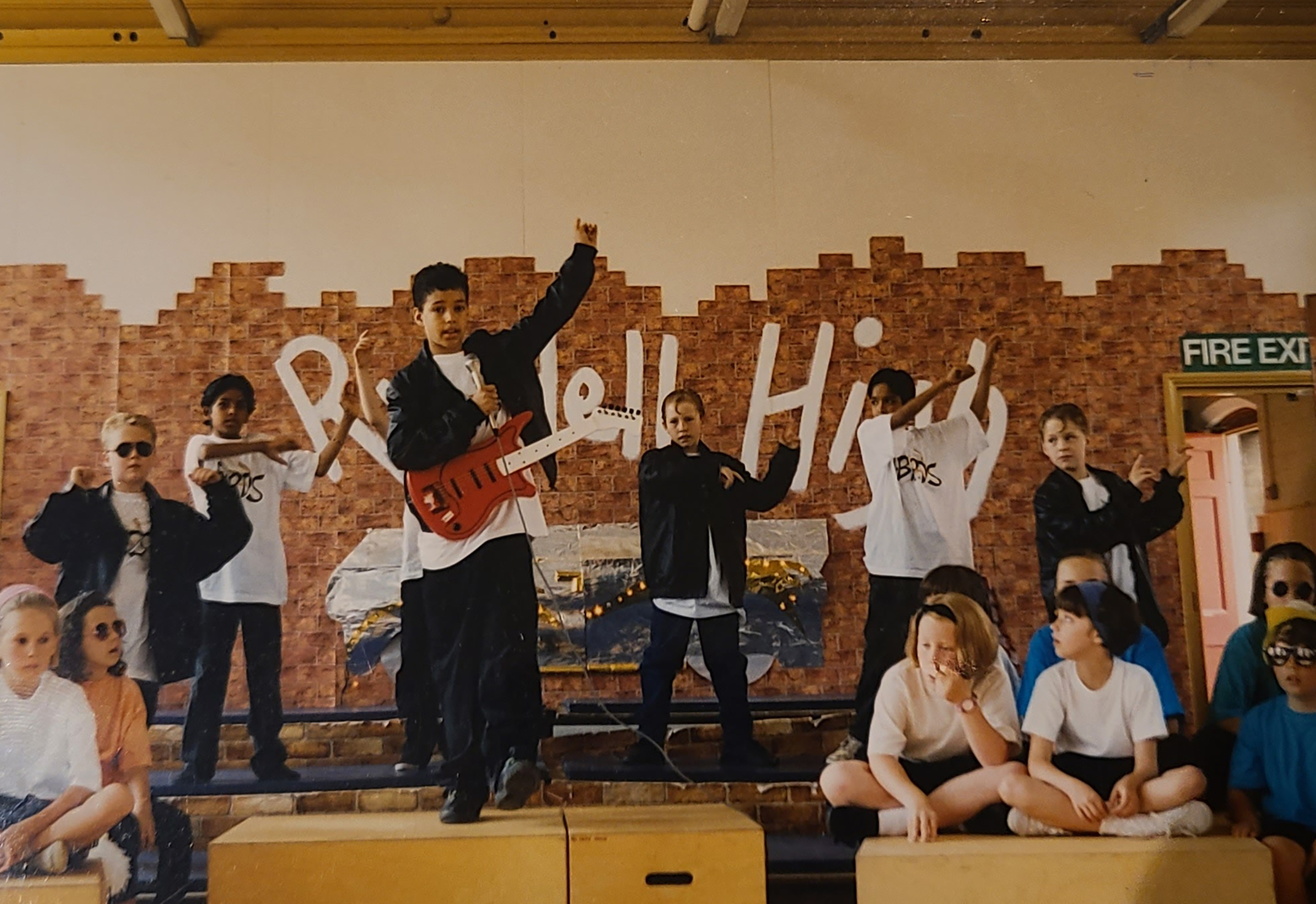
We’ll zoom past a return to his first love of DJing with a side of modeling—Alexander’s as tall as Michael Jordan and possessed of high cheekbones and a thousand-watt smile—and that’s where we pause. At the age 32, between music gigs in Dubai and Rio de Janeiro, Alexander’s story improbably lands on powder.
Always The Black Person
In 2016, Alexander was invited to DJ a heliski trip in a remote mountain range of British Columbia, an invitation he almost declined in his pursuit of perpetual summer (“Why would I go to a ski lodge if I couldn’t ski?” he says in his posh British accent). The host flew him out from the lodge one afternoon to meet the skiers on a mountaintop for lunch. Alexander sat through the flight awestruck at the expanse of winter-skirted peaks. After the helicopter touched down, he sprinted from it and swan dived; he resolved, lying there doing snow angels, to learn to ski.
Later that winter, on his first ski run ever, he fell 27 times. Instead of succumbing to discouragement, he focused on solving the problems of turns and speed. By the end of the day, he got down the same run with only seven falls. By his third ski season in 2019, curious to see how many vertical feet he could clock in a day at the famously stacked Revelstoke Mountain Resort, in British Columbia, he logged 49 runs for a total of over 103,000 feet. “That’s three Mount Everests,” he notes proudly.
Over those first few years, the same predictable joke flew repeatedly.
“As a mixed-race person, you always represent the minority of the group you’re in,” Alexander explains. “With my Black friends, I’m the white person. With my white friends, I’m the Black person. In skiing, I’m always the Black person. And I got the same joke on the slopes that any Jamaican probably gets when they’re near a winter sport: ‘are you part of the Jamaican bobsled team?’”
He enjoyed the parallel. Cool Runnings was one of his favorite movies growing up, a connection to his heritage in a home where he was largely raised without it, his father’s Jamaican accent only emerging on the phone to Alexander’s grandparents.
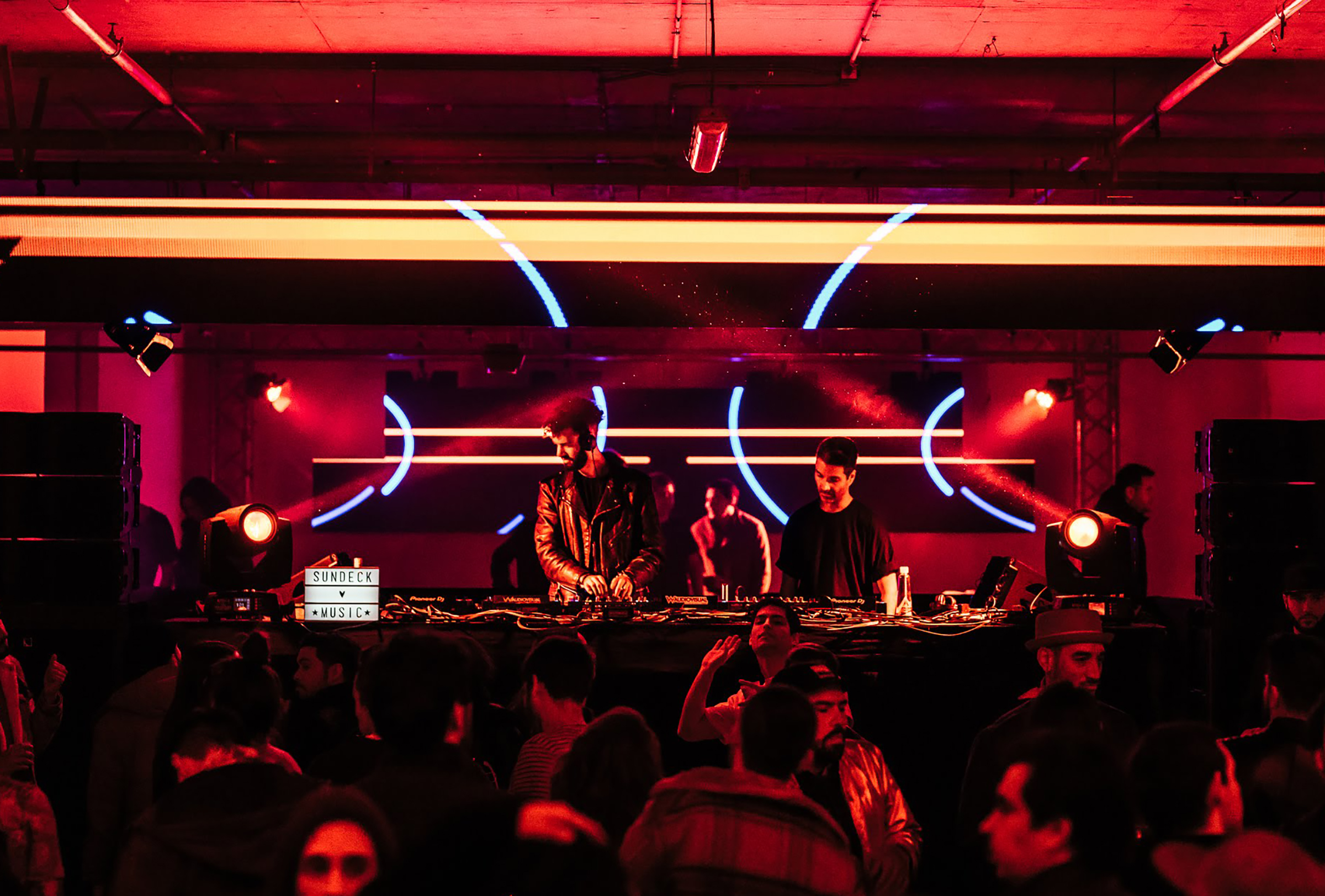
It was just a joke. But it rooted an outlandish idea. At age 35, Alexander wanted to retire from DJing anyway—he no longer felt challenged, and the party lifestyle might kill him if he stayed in it. He never dreamed of qualifying for the British ski team flush with elite athletes training since childhood. But in the 2018 Winter Olympics in Pyeongchang, Alexander had noted only three athletes, competing in bobsled and skeleton, from his father’s nation. In calculating possibilities and the cost-benefit analysis of failure, he concluded it was possible to make the Jamaican ski team. Or, really, to become it.
Avoiding Complete Detonation
At Revelstoke, just as Alexander settled into the Olympic idea, he met former U.S. National Ski Team athlete Gordon Gray. He asked Gray to ski a few runs and offer some tips.
“I remember on several occasions that morning, I considered overtaking him,” says Alexander—who, it’s hard not to notice, is supremely confident. “But I couldn’t do it in a way that I knew was going to be totally safe. If I hurt myself, that’s fine, but the last thing that I wanted to do was hurt somebody else.”
Gray told him his technique was atrocious. But he was fearless. You can teach technique, Gray said, but you can’t teach fearlessness. That’s half the battle won right there.
“At the bottom of the first pitch we skied together, I looked back up, and there he is: straight lining it, full gas, looking like the DeLorean [from Back to the Future] trying to reach escape velocity,” says Gray. “He was leaning way back, no control. At any point, he could have had complete detonation. His own well-being seemed a complete afterthought.”
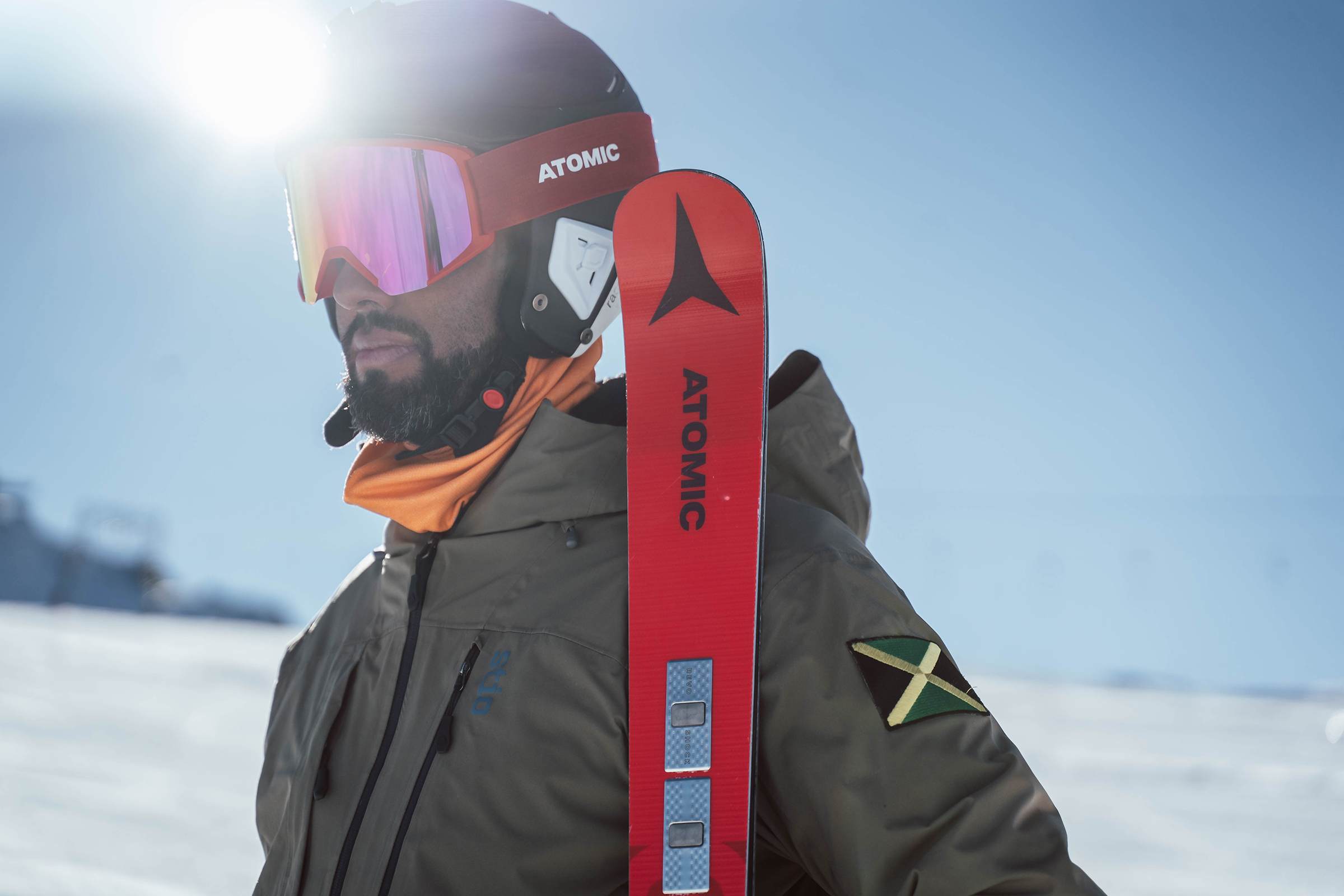
To understand why fear might be an issue in ski racing, Gray uses this analogy: you’re basically going the same speed as driving down a highway. But instead of relying on the steering, wheels and engine, you’re relying on your own ability to balance on two planks (which, if you’re new to the sport, are completely foreign tools) and muscle memory (which, in this case, was nonexistent). A crash at that kind of speed in nothing but a Lycra suit means either walking away like a hero, or… well, not walking away at all.
That afternoon at apres, the rumor of Alexander’s Olympic bid spread like a merry brushfire in a woke white crowd, representative of a ski culture hungry for new icons of diversity (often without having to do the work of addressing why people of color aren’t present in the first place)—ideally uncomplicated ones, pure-intentioned messiahs we can pin responsibility on to save us from ourselves. Except Alexander’s not that. And, it goes without saying but bears mentioning, no one should have to be.
Gray saw the fire start. He pulled Alexander aside.
“I didn’t want to stroke his ego on this,” Gray says. “I told him, ‘You’ve gotta do this for the right reasons.’ The Olympics are the pinnacle and they’re about merit, not media stunts. I gave him a snapshot of what it would actually take between this wild idea and actual events.” Gray laid out the significant training time, coaching, travel to races, the sheer financial implications. “I wanted him to really think about this.”
Alexander did. Leveraging his logical mind (“Robotic, my ex-girlfriends would say,” he notes ruefully), he mapped out the races he needed to compete in to achieve the necessary International Ski Federation points to qualify for the Olympics. He achieved his Jamaican citizenship, a simple logistical process to formalize his descent. He made contact with Dudley Stokes, pilot for the famous 1988 Jamaican bobsled team, setting up a weekly call to talk about sports psychology and navigating terra incognita. He attended pre-race coach meetings himself—as he was mostly without one—and skewed the average age at any given competition by ten years. Largely without sponsors, he’s spent over $60,000 of his own money—much of it savings from his DJing days as well as a loan from his parents, who’d inherited a significant sum from Alexander’s father’s parents—pursuing this dream.
And he tracked down the Jamaican Ski Federation, an obscure website-less entity with a dubious Hotmail account that miraculously replied to his shot-in-the-dark email. Richard Salm, the director, spent his summers in England, he wrote to Alexander. He could meet him the next time Alexander, who was loosely living in New York then in between his last scattered DJ gigs, came to see his family. In fact, Salm would pick him up at the airport.
Alexander exited Arrivals in London to find a man holding a sign with his name on it. An old man. A white man.
“I have to admit.” Alexander says, “my first thought was, I wonder if his family were slave owners in Jamaica.”
They weren’t. Salm was an expat Brit, a former World Cup ski racer who married a Jamaican woman. He set up the Jamaican Ski Federation in the late 90s for their son Andrew to compete internationally. But Andrew only raced once, placing 54th in the World Championships, and after Kerr’s Olympic run, the Federation went dormant. In the gloom of the London pub where he took Alexander to talk logistics, he looked into the younger man’s eyes. Like Morpheus to Neo, he said, “I’ve been looking for someone like you.”
There was one last thing on Alexander’s checklist. He’d never actually been to Jamaica. His parents never took him. His father didn’t even return until a few years ago, when Alexander paid his way.
“I knew I had to do this, as part of my life,” Alexander says. Last August, after sitting through the requisite quarantine in St. Ann’s in Jamaica, he drove around as much of the country as he could—and thanks to a couple TV interviews he’d done there, he was recognized everywhere he went.
“Jamaicans are incredibly proud of the Olympics,” he says. “Everyone said, ‘We’re so proud of you.’ I would reply, ‘I haven’t done it yet,’ and they’d insist, ‘We’re so proud of you!’”
So is his father, even if he’s not emotive with his son—or anyone really, according to Ann. “I’m glad to know that my son is representing Jamaica in the 2022 Olympics,” Keith told me succinctly. “His grandparents would also be so proud.”
Off The Podium
Alexander doesn’t aim to medal, or even finish in the top tier. “I’ll likely finish 67th,” he says precisely. “My gold medal is walking in the Opening Ceremonies.” He doesn’t aim to compete in another Games, either. Rather, he hopes to take over the Jamaican Ski Federation (Salm passed away unexpectedly in September), to guide the next generation of Jamaican skiers.
It’s not the typical Olympic inspirational story of redemptive gold medal dreams (but then, Alexander’s not your typical anything). He’s simply trying to see what’s possible. And if, in the process, he shows the rest of us what’s possible, perhaps that’s inspiration enough.
“I’m hoping that what he does will open up more people’s hearts to be more inclusive in snow sports,” says Henri Rivers, President of the National Brotherhood of Skiers (NBS), whose mission is to identify, develop and support athletes of color representing the U.S. in international competitions, as well as increase participation in winter sports. Rivers has been an alpine race coach for twenty years and worked closely with Kerr on his Olympic bid. But given Alexander is neither American nor representing the U.S., NBS can offer moral support only—no small offering, coming from the most well-known organization of Black skiers in the country. “I admire what he’s doing. This is his drive and his desire. He’s doing what he wants to do. And that’s the story that needs to be told.”
More Must-Reads From TIME
- The 100 Most Influential People of 2024
- The Revolution of Yulia Navalnaya
- 6 Compliments That Land Every Time
- What's the Deal With the Bitcoin Halving?
- If You're Dating Right Now , You're Brave: Column
- The AI That Could Heal a Divided Internet
- Fallout Is a Brilliant Model for the Future of Video Game Adaptations
- Want Weekly Recs on What to Watch, Read, and More? Sign Up for Worth Your Time
Contact us at letters@time.com